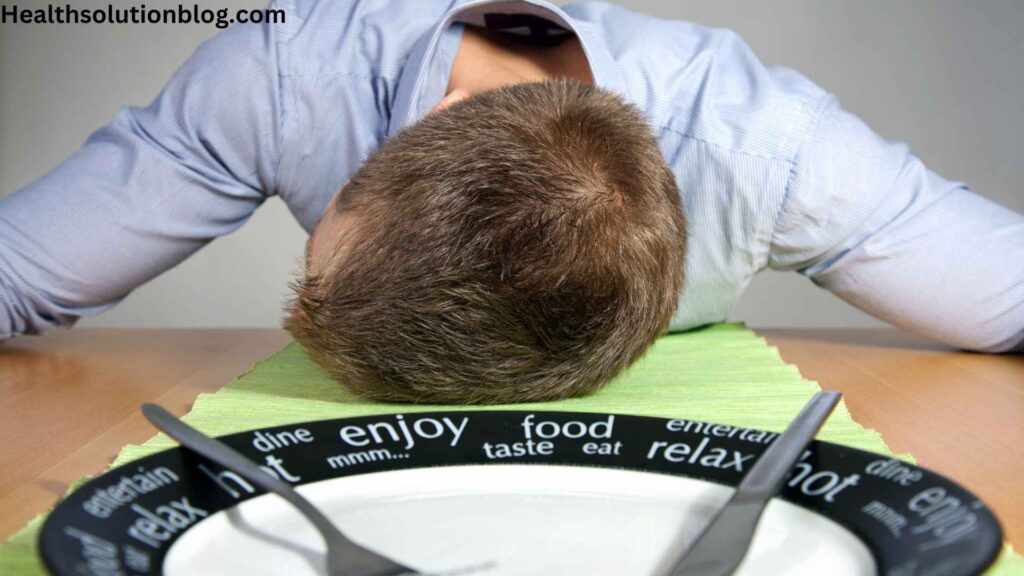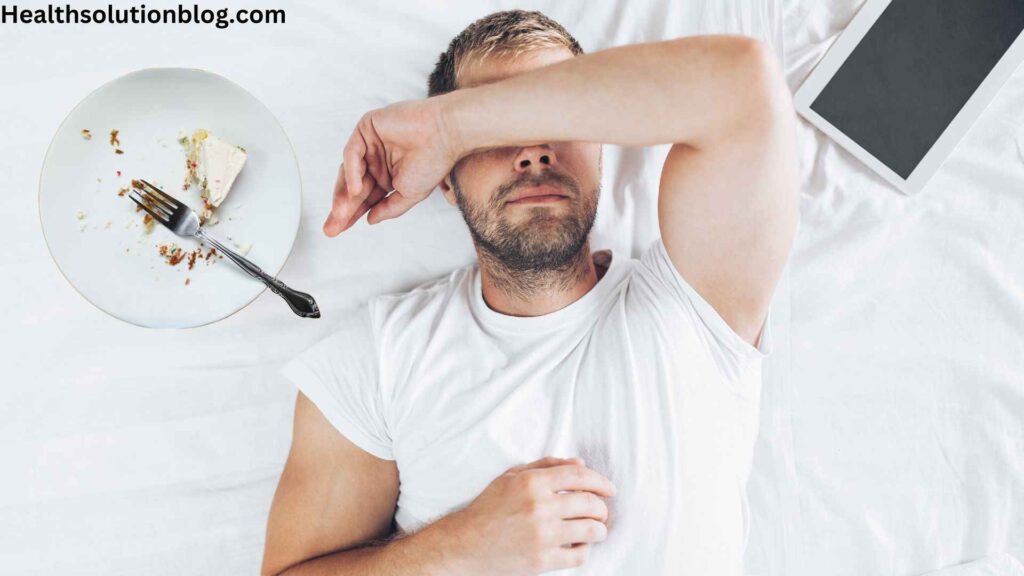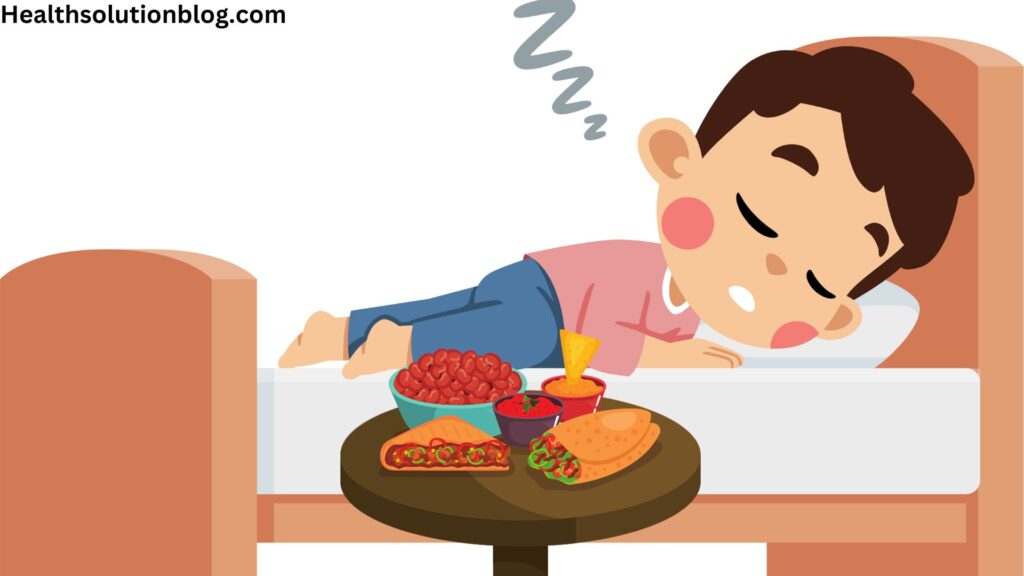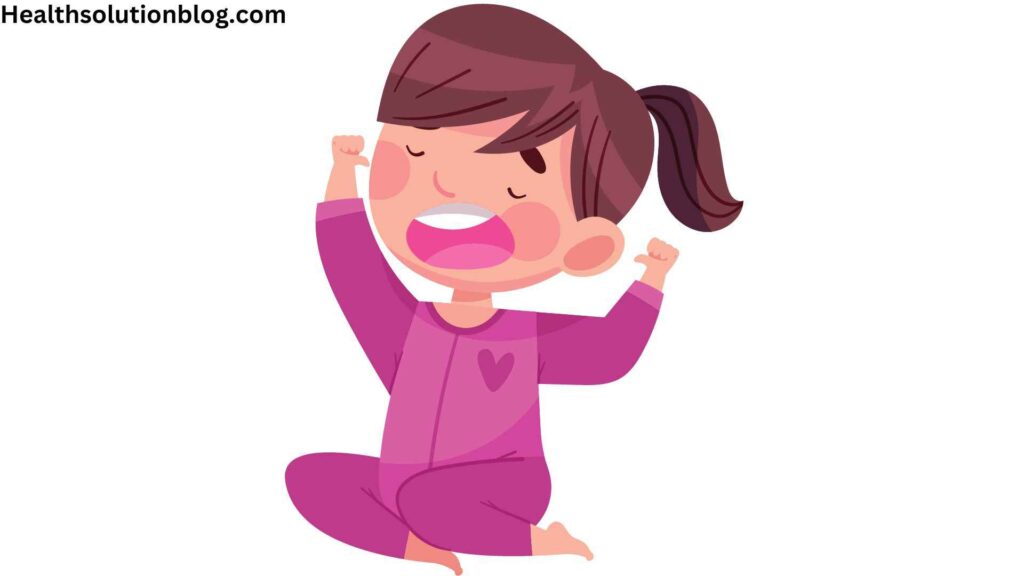
Feeling sleepy after eating is a common experience that can have various causes, including diabetes. However, it is important to note that drowsiness alone is not a definitive sign of diabetes. This article will explore the connection between post-meal drowsiness and diabetes, discuss other possible causes, and offer tips for preventing post-meal sleepiness.
According to a recent survey, 45% of people report feeling sleepy after eating at least once a week. This suggests that post-meal drowsiness is a common experience, but it is important to understand the underlying causes to determine if it is a cause for concern.
People often wonder, “Is feeling sleepy after eating a sign of diabetes?” This topic has gathered numerous queries. Let’s explore this interesting topic in more depth.
Diabetic Boots for Women: Exploring Style, Comfort, and top 10 picks on Amazon
Is Falling Asleep After Eating a Sign of Diabetes?

The Connection and Varying Perspectives
i. Exploring the Link
Interestingly, many individuals who experience post-meal drowsiness often find themselves questioning whether it’s an early sign of diabetes. This connection is not unwarranted, as diabetes can indeed manifest itself in various ways, affecting both our energy levels and overall well-being. To delve deeper into this, let’s examine how diabetes and post-meal sleepiness may be linked.
ii. Diverse Perspectives
In the domain of the relationship between feeling sleepy after eating and diabetes, there are numerous perspectives. Various sources, including medical professionals, nutrition experts, and personal stories, offer their unique viewpoints. It’s crucial to consider these differing opinions, as they contribute to the complexity of this topic.
iii. Feeling sleepy after eating can be a sign but is not conclusive proof of diabetes.
While the connection between post-meal drowsiness and diabetes is worth exploring, it’s important to note that feeling sleepy after eating is not conclusive proof of diabetes. Rather, it can serve as an indicator, among other factors, that prompts individuals to consider their overall health and seek medical advice when necessary. This distinction is essential to understand as we further examine this topic.
Other Reasons for Being Sleepy After Eating

Factors contributing to post-meal drowsiness beyond diabetes:
In addition to diabetes, there are a number of other factors that can contribute to post-meal drowsiness. These include:
1. Eating too much food and its impact on drowsiness
When you eat a large meal, your body has to work harder to digest it. This involves breaking down the food into smaller molecules that can be absorbed into the bloodstream. The digestion process also requires a significant amount of energy.
As a result of the increased energy demands of digestion, you may feel tired and sleepy after eating a large meal. This is especially true if the meal is high in fat, as fat is more difficult to digest than other nutrients.
2. Food choices, particularly the role of carbohydrates and sugar
Foods that are high in carbohydrates or sugar are broken down quickly into glucose, which is the body’s main source of energy. This can lead to a rapid rise in blood sugar levels.
In response to the rise in blood sugar levels, the body releases insulin. Insulin is a hormone that helps the body’s cells absorb glucose from the bloodstream. However, if the body releases too much insulin, it can lead to a drop in blood sugar levels, which can cause fatigue and drowsiness.
3. The importance of staying hydrated
Dehydration can also contribute to post-meal drowsiness. When you are dehydrated, your blood volume decreases. This makes it difficult for your body to deliver oxygen and nutrients to your cells, including your brain cells. This can lead to fatigue and drowsiness.
4. The role of insulin sensitivity in energy levels
Insulin sensitivity is how well your body’s cells respond to insulin. If you are insulin resistant, your cells do not respond as well to insulin. This means that your body needs to produce more insulin to lower blood sugar levels.
High levels of insulin can have a number of negative effects on the body, including causing fatigue and drowsiness. This is because insulin can promote the storage of glucose in the liver and muscle cells. This can reduce the amount of glucose available to the brain, which can lead to fatigue and drowsiness.
5. Lack of sleep:
If you are not getting enough sleep, you are more likely to experience fatigue during the day, including after eating.
6. Certain medications:
Some medications, such as antihistamines and antidepressants, can cause drowsiness as a side effect.
7. Medical conditions:
Other medical conditions, such as anemia, thyroid problems, and heart disease, can also cause fatigue and drowsiness.
Understanding the Connection: Eating and Sleepiness:

Eating, Sleepiness, and the Broader Context
i. Relationship between eating and sleepiness
The connection between what we eat and our subsequent feelings of sleepiness is a topic worth exploring. As already explained, when we consume a meal, our bodies undergo a complex process of digestion, which requires energy. This digestive process, in itself, can result in a sense of drowsiness as the body directs its resources to break down and absorb nutrients from the food we’ve ingested.
ii. Diabetes Symptoms in Context
Diabetes is a chronic health condition that affects how the body turns food into energy. People with diabetes either do not produce enough insulin or cannot use insulin effectively. Insulin is a hormone that helps the body’s cells use glucose for energy.
One of the most common symptoms of diabetes is high blood sugar levels (hyperglycemia). Hyperglycemia can cause a variety of symptoms, including fatigue, drowsiness, and blurred vision. This is because the body’s cells are unable to get the glucose they need for energy.
Another symptom of diabetes is low blood sugar levels (hypoglycemia). Hypoglycemia can also cause fatigue and drowsiness, as the brain does not have enough glucose to function properly.
In addition to post-meal drowsiness, people with diabetes may also experience other sleep problems, such as insomnia and obstructive sleep apnea. These sleep problems can further contribute to daytime fatigue and sleepiness.
Overall, diabetes symptoms, including sleepiness, fit into the broader context of how diabetes affects the body’s ability to use glucose for energy. When blood sugar levels are not well controlled, people with diabetes are more likely to experience fatigue and sleepiness.
Moreover, the “National Diabetes Statistics Report” reveals the extensive impact of diabetes in the United States. According to the report:
iii. Fast Facts on Diabetes
Diabetes
Total: 37.3 million people have diabetes (11.3% of the US population)
Diagnosed: 28.7 million people, including 28.5 million adults
Undiagnosed: 8.5 million people (23.0% of adults) are undiagnosed.
Prediabetes
Total: 96 million people aged 18 years or older have prediabetes (38.0% of the adult US population)
65 years or older: 26.4 million people aged 65 years or older (48.8%) have prediabetes
These statistics emphasize the widespread presence of diabetes and prediabetes in the United States, highlighting the importance of understanding how diabetes affects the body’s ability to use glucose for energy. When blood sugar levels are not well controlled, individuals with diabetes are more likely to experience fatigue and sleepiness.”
Examining the Facts: Falling Asleep After Eating
i. The Science Behind Post-Meal Drowsiness
The scientific basis behind post-meal drowsiness is not fully understood, but it is thought to be related to a number of factors, including:
- Blood sugar levels: When you eat, your blood sugar levels rise. This triggers the release of insulin, a hormone that helps your body’s cells absorb glucose from the bloodstream. After eating, your blood sugar levels may drop too low (hypoglycemia), which can cause fatigue and drowsiness.
- Tryptophan: Tryptophan is an amino acid that is found in many foods, such as turkey, chicken, fish, and eggs. Tryptophan is converted into serotonin, a neurotransmitter that plays a role in sleep. The rise in blood sugar levels after eating may increase the amount of tryptophan that is transported to the brain, which could lead to increased serotonin production and sleepiness.
- Parasympathetic nervous system activation: The parasympathetic nervous system is responsible for the “rest and digest” response. After eating, there is a shift towards parasympathetic nervous system activation, which can lead to feelings of relaxation and sleepiness.
ii. Potential symptoms of high blood sugar
The potential symptoms of high blood sugar (hyperglycemia) include:
- Increased thirst
- Frequent urination
- Extreme hunger
- Unexplained weight loss
- Fatigue
- Blurred vision
- Slow-healing sores
- Fruity-smelling breath
If you are experiencing any of these symptoms, it is important to see a doctor right away. High blood sugar levels can lead to serious complications, such as heart disease, stroke, and nerve damage.
When to See a Doctor

i. Knowing When to Consult
If you are experiencing post-meal drowsiness on a regular basis, it is important to see a doctor to rule out any underlying medical conditions. However, there are some specific instances when it is especially important to see a doctor, such as if you are experiencing:
- Severe or frequent post-meal drowsiness
- Post-meal drowsiness that is accompanied by other symptoms, such as increased thirst, frequent urination, unexplained weight loss, or blurred vision
- Post-meal drowsiness that interferes with your daily activities, such as work, school, or driving
It is also important to see a doctor if you have any risk factors for diabetes, such as:
- Family history of diabetes
- Overweight or obesity
- Physical inactivity
- Certain medical conditions, such as prediabetes, polycystic ovary syndrome (PCOS), and gestational diabetes.
ii. The importance of diabetes care and early diagnosis
Diabetes can also lead to serious other complications, such as heart disease, stroke, nerve damage, and kidney failure. However, early diagnosis and treatment can help to prevent or delay the onset of complications.
If you are diagnosed with diabetes, it is important to work with your doctor to develop a treatment plan that is right for you. This plan may include lifestyle changes, such as diet and exercise, as well as medication.
By following your treatment plan, you can help to manage your blood sugar levels and reduce your risk of complications.
Preventing Post-Meal Drowsiness

A. Practical nutrition tips to reduce drowsiness after eating:
Here are some practical nutrition tips to reduce drowsiness after eating:
- Eat smaller, more frequent meals. This will help to keep your blood sugar levels stable and prevent spikes and crashes.
- Avoid sugary drinks and foods. Sugary drinks and foods can cause a rapid rise in blood sugar levels, followed by a crash.
- Stay hydrated. Dehydration can make you feel tired and sluggish. Aim to drink eight glasses of water per day.
- Incorporate physical activity. Physical activity helps to improve insulin sensitivity and regulate blood sugar levels. Aim for at least 30 minutes of moderate-intensity exercise most days of the week.
In addition to these general tips, there are some specific foods and drinks that you can choose to help reduce post-meal drowsiness. For example, foods that are high in fiber and protein help to slow down the digestion of carbohydrates and prevent spikes in blood sugar levels.
Here are some examples of foods that are good for preventing post-meal drowsiness:
- Fruits and vegetables
- Whole grains
- Lean protein sources, such as fish, chicken, and beans
- Healthy fats, such as nuts, seeds, and avocados
You can also try drinking green tea or coffee after meals. Green tea contains caffeine and theanine, which have both been shown to improve alertness and reduce fatigue. Coffee contains caffeine, which can also improve alertness. However, it is important to limit your intake of caffeine to 400 milligrams per day, as too much caffeine can lead to side effects such as anxiety and insomnia.
Research on the Connection Between Sleep Disorders and Diabetes

Ongoing research regarding sleep disorders and diabetes.
There is a growing body of research on the connection between sleep disorders and diabetes. Scientists are working to understand the complex relationship between these two conditions and to develop new ways to prevent and treat them.
Some of the ongoing research on sleep disorders and diabetes includes:
- Identifying the biological mechanisms that link sleep disorders and diabetes. Researchers are working to identify the specific genes and proteins that play a role in both conditions. This knowledge could lead to the development of new diagnostic tools and treatments.
- Studying the impact of sleep disorders on diabetes management. Researchers are investigating how sleep disorders affect blood sugar control, insulin sensitivity, and other aspects of diabetes management. This research could help to develop new strategies for managing diabetes in people with sleep disorders.
- Developing new interventions to improve sleep quality in people with diabetes. Researchers are developing new behavioral and pharmacological treatments to help people with diabetes get better sleep. This research could lead to improved diabetes outcomes and overall quality of life.
Here are some specific examples of ongoing research on sleep disorders and diabetes:
- A study published in the journal Diabetes Care found that people with diabetes who had obstructive sleep apnea (OSA) were more likely to experience postprandial hyperglycemia (high blood sugar levels after eating) than people with diabetes who did not have OSA.
- A study published in the journal Sleep found that people with type 2 diabetes who had short sleep duration (less than 6 hours per night) were more likely to have higher blood sugar levels and insulin resistance than people with type 2 diabetes who had longer sleep duration (7-8 hours per night).
- A study published in the journal Diabetologia found that people with type 2 diabetes who received cognitive-behavioral therapy for insomnia (CBT-I) experienced significant improvements in sleep quality and blood sugar control.
This research is still ongoing, but it is clear that there is a strong connection between sleep disorders and diabetes. By understanding this connection, scientists can develop new ways to prevent and treat both conditions.
Other Causes of Postprandial Somnolence (Falling Asleep After Eating)
In addition to the factors discussed in previous sections, there are many other factors that can contribute to postprandial somnolence (falling asleep after eating), including:
- Medication side effects: Some medications, such as antihistamines, antidepressants, and pain relievers, can cause drowsiness as a side effect.
- Medical conditions: Other medical conditions, such as anemia, thyroid problems, and heart disease, can also cause fatigue and drowsiness.
- Diet and lifestyle: Eating a diet that is high in processed foods and sugary drinks can also contribute to post-meal drowsiness. Additionally, lack of exercise and poor sleep hygiene can also play a role.
How to reduce postprandial somnolence from additional factors:
- Medication side effects: If you are experiencing post-meal drowsiness as a side effect of medication, talk to your doctor about your options. They may be able to prescribe a different medication or adjust the dosage of your current medication.
- Medical conditions: If you have a medical condition that is contributing to your post-meal drowsiness, work with your doctor to manage your condition. This may involve taking medication, making lifestyle changes, or both.
- Diet and lifestyle: To reduce post-meal drowsiness from diet and lifestyle factors, focus on eating a healthy diet, getting regular exercise, and getting enough sleep.
Conclusion:
In our exploration of “Is feeling sleepy after eating a sign of diabetes”, we discovered that while it can be a clue, it’s not the only piece of the puzzle. There are various reasons why we might feel drowsy after a meal, such as eating too much or making certain food choices. We also learned the importance of talking to a healthcare professional and getting an early diagnosis if we suspect diabetes.
To help you feel more awake after meals, we shared some straightforward tips, like eating smaller, more frequent meals, avoiding sugary foods and drinks, staying hydrated, and including some light physical activity in your routine.
Moreover, we peeked into the ongoing research about the connection between sleep problems and diabetes. And we didn’t forget to mention that there are other possible causes for post-meal sleepiness besides diabetes.
As we conclude this journey, it’s worth pondering: How do you want to feel after your next meal? The mysteries of post-meal sleepiness are not all solved, but with some simple knowledge and choices, you can have more control over your post-meal energy. The road to better health might start with one simple question: What will you do next?
FAQs- Is feeling sleepy after eating a sign of diabetes
Q: What is post-meal drowsiness?
Post-meal drowsiness, also known as postprandial somnolence, is a common experience that occurs after eating a meal. It is characterized by a feeling of tiredness or sleepiness.
Q: What causes post-meal drowsiness?
There are a number of factors that can contribute to post-meal drowsiness, including:
- Blood sugar levels: After eating, blood sugar levels rise. This can lead to the release of insulin, a hormone that helps the body’s cells absorb glucose from the bloodstream. Once the glucose has been absorbed into the cells, blood sugar levels drop. This drop in blood sugar levels can cause feelings of drowsiness.
- Tryptophan: Tryptophan is an amino acid that is found in many foods, such as turkey, chicken, fish, and eggs. Tryptophan is converted into serotonin, a neurotransmitter that plays a role in sleep. Eating a meal that is high in tryptophan can increase the amount of serotonin produced in the brain, which can lead to drowsiness.
- Parasympathetic nervous system activation: The parasympathetic nervous system is responsible for the “rest and digest” response. After eating, there is a shift towards parasympathetic nervous system activation, which can lead to feelings of relaxation and sleepiness.
Q: Is post-meal drowsiness a sign of diabetes?
Post-meal drowsiness can be a sign of diabetes, but it is not always a cause for concern. Other factors, such as eating a large meal or eating foods that are high in carbohydrates or sugar, can also cause post-meal drowsiness.
If you are experiencing post-meal drowsiness on a regular basis, it is important to talk to your doctor to rule out any underlying medical conditions.
Q. What’s the relationship between high blood sugar and sleepiness?
High blood sugar levels can lead to fatigue and sleepiness. It’s a concern for individuals with diabetes, but other factors can also cause sleepiness after eating.
Q: How can I reduce post-meal drowsiness?
There are a number of things you can do to reduce post-meal drowsiness, including:
- Eat smaller, more frequent meals: This will help to keep your blood sugar levels stable and prevent spikes and crashes.
- Avoid sugary drinks and foods: Sugary drinks and foods can cause a rapid rise in blood sugar levels, followed by a crash.
- Stay hydrated: Dehydration can make you feel tired and sluggish. Aim to drink eight glasses of water per day.
- Get regular exercise: Exercise helps to improve insulin sensitivity and regulate blood sugar levels. Aim for at least 30 minutes of moderate-intensity exercise most days of the week.
Q: When should I see a doctor about post-meal drowsiness?
You should see a doctor about post-meal drowsiness if:
- It is severe or frequent.
- It is accompanied by other symptoms, such as increased thirst, frequent urination, unexplained weight loss, or blurred vision.
- It is interfering with your daily activities, such as work, school, or driving.
Q. Are there other causes of post-meal sleepiness besides diabetes?
Yes, several factors, such as overeating, food choices, and even dehydration, can contribute to feeling sleepy after eating.
Sources:
https://www.cdc.gov/diabetes/data/statistics-report/index.html





